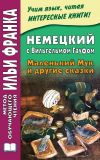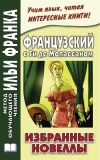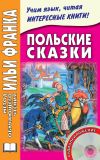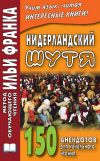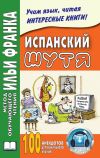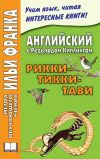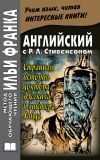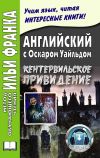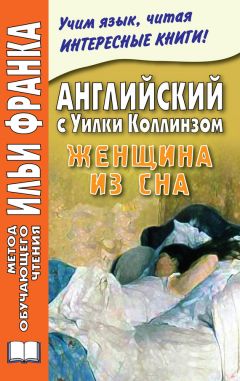
Автор книги: Уильям Коллинз
Жанр: Иностранные языки, Наука и Образование
Возрастные ограничения: +16
сообщить о неприемлемом содержимом
Текущая страница: 3 (всего у книги 16 страниц) [доступный отрывок для чтения: 5 страниц]
“Do you hear (ты слышишь)? There is a woman at the bottom of it, Percy (тут замешана женщина, Перси: «женщина находится в основании этого»; to be at the bottom of smth. – лежать в основе чего-л., быть /истинной/ причиной; bottom – низ, нижняя часть; дно /моря, реки, озера/; суть, основа)! There is love and murder in it, Percy (тут есть любовь и убийство, Перси)! Where are the people of the inn (где люди из гостиницы)? Go into the yard, and call to them again (пойди во двор и позови их снова).”
My wife belongs, on her mother’s side, to the South of France (моя жена происходит – со стороны матери – с юга Франции; to belong – принадлежать, быть частью; происходить, быть родом).

By this time Mrs. Fairbank has got over her terror; she is devoured by curiosity now. The miserable creature on the straw has appealed to the imaginative side of her character. Her illimitable appetite for romance hungers and thirsts for more. She shakes me impatiently by the arm.
“Do you hear? There is a woman at the bottom of it, Percy! There is love and murder in it, Percy! Where are the people of the inn? Go into the yard, and call to them again.”
My wife belongs, on her mother’s side, to the South of France.
The South of France breeds fine women with hot tempers (юг Франции взращивает прекрасных женщин с горячим нравом; to breed – вынашивать /детенышей/; высиживать /птенцов/; порождать, вызывать; hot temper – горячность, вспыльчивость; взрывной характер; hot – горячий; пылкий, страстный; неистовый). I say no more (больше я /ничего/ не говорю). Married men will understand my position (женатые мужчины поймут мое положение). Single men may need to be told that there are occasions (холостякам, возможно, необходимо сказать, что бывают случаи; single – один, единственный; одинокий; лицо, не состоящее в браке; to need – нуждаться, иметь потребность /в чем-л./; требоваться) when we must not only love and honor (когда мы должны не только любить и почитать; to honor – почитать, уважать; honor – честь; уважение, почтение) – we must also obey – our wives (мы должны также слушаться наших жен; to obey – слушаться, подчиняться).
I turn to the door to obey my wife (я поворачиваюсь к двери /конюшни/, чтобы подчиниться моей жене), and find myself confronted by a stranger who has stolen on us unawares (и нахожу себя столкнувшимся /лицом к лицу/ с незнакомцем = оказываюсь лицом к лицу с незнакомцем, который подкрался к нам незаметно; to confront – встретиться лицом к лицу; столкнуться; to steal – воровать, красть; делать что-л. незаметно, тайком; прокрадываться; unawares – неожиданно, врасплох; aware – /о/сознающий /что-л./, знающий /о чем-л./). The stranger is a tiny, sleepy, rosy old man (это крошечный, сонный, румяный старичок: «старый человек»; rosy – розовый; румяный; цветущий /о человеке/), with a vacant pudding-face (с толстой бездумной физиономией; pudding-face – толстая, невыразительная физиономия; pudding – пудинг, запеканка; что-л., напоминающее пудинг /видом или консистенцией/; /брит., разг./ толстяк; face – лицо, физиономия), and a shining bald head (и блестящей лысой головой; to shine – светить/ся/, сиять; блестеть). He wears drab breeches and gaiters (он носит коричневые брюки и гетры; drab – ткань серо-коричневого цвета; тускло-коричневый; breeches – бриджи; /разг./ брюки, штаны), and a respectable square-tailed ancient black coat (и представительный старомодный черный фрак с широкими /прямоугольными/ фалдами; respectable – почтенный, представительный; приличный; square – квадратный; широкий; tail – хвост; задняя или нижняя часть; фалда, пола; coat – пиджак; куртка; tail-coat – фрак). I feel instinctively that here is the landlord of the inn (я интуитивно понимаю, что вот /стоит/ хозяин гостиницы; to feel – чувствовать; понимать, сознавать; landlord – помещик, сдающий землю в аренду; хозяин гостиницы, пансиона и т. д.; land – земля; lord – господин; повелитель, властелин).

The South of France breeds fine women with hot tempers. I say no more. Married men will understand my position. Single men may need to be told that there are occasions when we must not only love and honor – we must also obey – our wives.
I turn to the door to obey my wife, and find myself confronted by a stranger who has stolen on us unawares. The stranger is a tiny, sleepy, rosy old man, with a vacant pudding-face, and a shining bald head. He wears drab breeches and gaiters, and a respectable square-tailed ancient black coat. I feel instinctively that here is the landlord of the inn.
“Good morning, sir,” says the rosy old man (доброе утро, сэр, – говорит румяный старик). “I’m a little hard of hearing (я немного туговат на ухо; hard – твердый; трудный, требующий усилий; hearing – слух; предел слышимости). Was it you that was a-calling just now in the yard (это вы кричали только что во дворе)?”
Before I can answer, my wife interposes (прежде чем я могу ответить, вмешивается моя жена; to interpose – вставлять, помещать между; вклиниваться; вмешиваться). She insists (in a shrill voice, adapted to our host’s hardness of hearing) on knowing (она требует (пронзительным голосом, приспособленным к тугоухости = рассчитанным на тугоухость /хозяина/), чтобы ей рассказали; to insist – настаивать; настойчиво требовать; to know – знать; узнавать) who that unfortunate person is sleeping on the straw (кто этот несчастный, спящий на соломе; person – человек; личность, особа). “Where does he come from (откуда он родом; to come from – происходить, иметь происхождение)? Why does he say such dreadful things in his sleep (почему он говорит такие ужасные вещи во сне)? Is he married or single (женат он или холост)? Did he ever fall in love with a murderess (был ли когда-нибудь влюблен в убийцу; murderess – женщина-убийца; murder – убийство; to murder – убивать)? What sort of a looking woman was she (как выглядела та женщина; sort – сорт, вид, род; тип человека; what sort of? – что за?, какой?)? Did she really stab him or not (она действительно ударила его ножом или нет; to stab – наносить удар, колоть /ножом, кинжалом/)? In short, dear Mr. Landlord, tell us the whole story (короче говоря, дорогой мистер Хозяин, расскажите нам всю историю; Mr. = Mister; whole – весь, целый)!”

“Good morning, sir,” says the rosy old man. “I’m a little hard of hearing. Was it you that was a-calling just now in the yard?”
Before I can answer, my wife interposes. She insists (in a shrill voice, adapted to our host’s hardness of hearing) on knowing who that unfortunate person is sleeping on the straw. “Where does he come from? Why does he say such dreadful things in his sleep? Is he married or single? Did he ever fall in love with a murderess? What sort of a looking woman was she? Did she really stab him or not? In short, dear Mr. Landlord, tell us the whole story!”
Dear Mr. Landlord waits drowsily until Mrs. Fairbank has quite done (дорогой мистер Хозяин сонно ждет, пока миссис Фэрбанк не закончит; drowsily – сонно; вяло; drowse – сонливость, дремота; quite – вполне, совершенно; совсем; to do – делать; заканчивать, кончать) – then delivers himself of his reply as follows (затем произносит следующий ответ: «ответ как следует /ниже/»; to deliver – доставлять; произносить, читать /лекцию, речь/; высказаться):
“His name’s Francis Raven (его имя/его зовут Фрэнсис Рейвен). He’s an Independent Methodist (он независимый методист; to depend – зависеть). He was forty-five year old last birthday (ему исполнилось сорок пять лет в прошлый день рождения; year /разг./ = years; birth – рождение). And he’s my hostler (он мой конюх). That’s his story (такова его история).”
My wife’s hot southern temper finds its way to her foot (горячая южная кровь моей жены устремляется: «находит свой путь» в ее ногу), and expresses itself by a stamp on the stable yard (и выражает себя = выражается в топанье об конюшенный двор; stamp – штамп, печать; топанье /ногами/; to stamp – штамповать, ставить печать; топать /ногами/).
The landlord turns himself sleepily round, and looks at the horses (хозяин сонно оборачивается: «поворачивает себя вокруг» и смотрит на лошадей). “A fine pair of horses, them two in the yard (прекрасная пара лошадей, эти две во дворе). Do you want to put ’em in my stables (вы хотите поставить их в мою конюшню; ’em = them)?” I reply in the affirmative by a nod (я отвечаю утвердительно кивком; affirmative – утверждение, заявление; утвердительный; to affirm – подтверждать; утверждать).

Dear Mr. Landlord waits drowsily until Mrs. Fairbank has quite done – then delivers himself of his reply as follows:
“His name’s Francis Raven. He’s an Independent Methodist. He was forty-five year old last birthday. And he’s my hostler. That’s his story.”
My wife’s hot southern temper finds its way to her foot, and expresses itself by a stamp on the stable yard.
The landlord turns himself sleepily round, and looks at the horses. “A fine pair of horses, them two in the yard. Do you want to put ’em in my stables?” I reply in the affirmative by a nod.
The landlord, bent on making himself agreeable to my wife (хозяин гостиницы, твердо решив угодить моей жене: «сделать себя приятным»; to bend – гнуть/ся/, сгибать/ся/; to be bent on /making/ smth. – твердо решиться на что-л., твердо решить сделать что-л.: «быть склонным сделать что-л.»; agreeable – приятный, милый; /разг./ выражающий согласие /сделать что-л./; to agree – соглашаться; /разг./ быть полезным, подходящим), addresses her once more (обращается к ней еще раз). “I’m a-going to wake Francis Raven (я собираюсь разбудить Фрэнсиса Рейвена; to be going to do smth. – собираться сделать что-л.). He’s an Independent Methodist. He was forty-five year old last birthday. And he’s my hostler. That’s his story.”
Having issued this second edition of his interesting narrative, the landlord enters the stable (выдав это второе издание своего интересного рассказа, хозяин входит в конюшню; to issue – выпускать, издавать). We follow him to see how he will wake Francis Raven (мы следуем за ним, чтобы посмотреть, как он разбудит Фрэнсиса Рейвена), and what will happen upon that (и что при этом произойдет). The stable broom stands in a corner (конюшенная метла стоит в углу); the landlord takes it – advances toward the sleeping hostler (хозяин берет ее, приближается к спящему конюху) – and coolly stirs the man up with a broom (и спокойно тычет в него метлой; cool – прохладный; спокойный, невозмутимый; to stir up – приводить в движение, побуждать; расшевелить, разбудить) as if he was a wild beast in a cage (словно тот был дикий зверь в клетке).

The landlord, bent on making himself agreeable to my wife, addresses her once more. “I’m a-going to wake Francis Raven. He’s an Independent Methodist. He was forty-five year old last birthday. And he’s my hostler. That’s his story.”
Having issued this second edition of his interesting narrative, the landlord enters the stable. We follow him to see how he will wake Francis Raven, and what will happen upon that. The stable broom stands in a corner; the landlord takes it – advances toward the sleeping hostler – and coolly stirs the man up with a broom as if he was a wild beast in a cage.
Francis Raven starts to his feet with a cry of terror (Фрэнсис Рейвен вскакивает на ноги с криком ужаса) – looks at us wildly, with a horrid glare of suspicion in his eyes (смотрит на нас дико, со страшным огнем подозрения в глазах = опасливо сверкая глазами; wild – дикий; бурный, безудержный; исступленный; horrid – страшный, ужасный; отвратительный; glare – яркий, ослепительный свет; взгляд /особ. пристальный, проницательный, свирепый/; огонь во взгляде) – recovers himself the next moment (приходит в себя в следующий миг; to recover – вновь обретать; приходить в себя, оправляться /от болезни, удивления, испуга и т. д./) – and suddenly changes into a decent, quiet, respectable serving-man (и неожиданно превращается в скромного, тихого, приличного слугу: «служащего человека»; to change – /из/менять/ся/; превращать/ся/; decent – приличный, порядочный; скромный, пристойный; quiet – тихий; спокойный; respect – уважение; почтение; to serve – служить, быть слугой).
“I beg your pardon, ma’am (прошу прощения, мэм; ma’am = madam – мэм, мадам; мэм /обращение прислуги к хозяйке/). I beg your pardon, sir (прошу прощения, сэр).”
The tone and manner in which he makes his apologies (тон и манера, в которой он приносит извинения) are both above his apparent station in life (/оба/ находятся выше его очевидного положения в жизни; apparent – видимый; очевидный, явный; station – место; станция; общественное положение). I begin to catch the infection of Mrs. Fairbank’s interest in this man (я начинаю заражаться: «подхватывать заражение» интересом миссис Фэрбанк к этому человеку; to catch – поймать, схватить; заразиться, подхватить /болезнь/; infection – инфекция, заражение; заразительность /примера/). We both follow him out into the yard to see (мы оба следуем за ним во двор, чтобы посмотреть) what he will do with the horses (что он будет делать с лошадьми).

Francis Raven starts to his feet with a cry of terror – looks at us wildly, with a horrid glare of suspicion in his eyes – recovers himself the next moment – and suddenly changes into a decent, quiet, respectable serving-man.
“I beg your pardon, ma’am. I beg your pardon, sir.”
The tone and manner in which he makes his apologies are both above his apparent station in life. I begin to catch the infection of Mrs. Fairbank’s interest in this man. We both follow him out into the yard to see what he will do with the horses.
The manner in which he lifts the injured leg of the lame horse (манера, в которой = то, как он поднимает поврежденную ногу хромого коня; to injure – ушибить, повредить, ранить) tells me at once that he understands his business (сразу же говорит мне, что он смыслит в своем деле; to understand – понимать; смыслить, быть сведущим /в чем-л./). Quickly and quietly, he leads the animal into an empty stable (быстро и спокойно он заводит животное в пустое стойло); quickly and quietly, he gets a bucket of hot water (быстро и спокойно берет ведро горячей воды; to get – доставать и приносить), and puts the lame horse’s leg into it (и ставит в него ногу хромого коня). “The warm water will reduce the swelling, sir (теплая вода уменьшит опухоль, сэр; to reduce – снижать, ослаблять, уменьшать; to swell – надувать/ся/, раздувать/ся/; опухать). I will bandage the leg afterwards (потом я перевяжу ногу; to bandage – бинтовать, перевязывать; bandage – бинт; перевязка; afterwards – впоследствии, позже).” All that he does is done intelligently (все, что он делает, делается с толком; intelligently – умно, разумно, с пониманием /дела/); all that he says, he says to the purpose (все, что он говорит, он говорит по делу; to the purpose – к делу, кстати; purpose – намерение, цель; замысел).
Nothing wild, nothing strange about him now (ничего дикого, ничего странного в нем теперь нет). Is this the same man whom we heard talking in his sleep (неужели это тот же самый человек, который, как мы слышали, говорил во сне)? – the same man who woke with that cry of terror (тот же самый человек, который проснулся с тем криком ужаса) and that horrid suspicion in his eyes (и тем страшным подозрением в глазах)? I determine to try him with one or two questions (я решаю задать ему один или два = пару вопросов; to determine – определять; решать/ся/, принимать решение /сделать что-л./; to try – пытаться, пробовать; испытывать; расследовать /дело, случай/).

The manner in which he lifts the injured leg of the lame horse tells me at once that he understands his business. Quickly and quietly, he leads the animal into an empty stable; quickly and quietly, he gets a bucket of hot water, and puts the lame horse’s leg into it. “The warm water will reduce the swelling, sir. I will bandage the leg afterwards.” All that he does is done intelligently; all that he says, he says to the purpose.
Nothing wild, nothing strange about him now. Is this the same man whom we heard talking in his sleep? – the same man who woke with that cry of terror and that horrid suspicion in his eyes? I determine to try him with one or two questions.
III
“Not much to do here,” I say to the hostler (не много здесь работы: «не много делать здесь», – говорю я конюху).
“Very little to do, sir,” the hostler replies (очень мало, сэр, – отвечает конюх).
“Anybody staying in the house (кто-нибудь живет в гостинице; to stay – оставаться; останавливаться, гостить)?”
“The house is quite empty, sir (гостиница совсем пуста, сэр).”
“I thought you were all dead (я думал, вы все умерли; to think; dead – мертвый, умерший). I could make nobody hear me (я мог заставить никого услышать меня = я ни до кого не мог докричаться; to make – делать; заставлять, побуждать /кого-л. сделать что-л./).”
“The landlord is very deaf, sir (хозяин очень глух, сэр), and the waiter is out on an errand (а коридорный ушел по поручению; waiter – официант: «ждущий»; служащий, посыльный /на Лондонской фондовой бирже/; to be out – не быть дома, на месте; отсутствовать; errand – поручение, задание).”
“Yes; and you were fast asleep in the stable (да; а вы крепко спали в конюшне; asleep – спящий). Do you often take a nap in the daytime (вы часто дремлете в дневное время; nap – дремота; короткий сон)?”

“Not much to do here,” I say to the hostler.
“Very little to do, sir,” the hostler replies.
“Anybody staying in the house?”
“The house is quite empty, sir.”
“I thought you were all dead. I could make nobody hear me.”
“The landlord is very deaf, sir, and the waiter is out on an errand.”
“Yes; and you were fast asleep in the stable. Do you often take a nap in the daytime?”
The worn face of the hostler faintly flushes (изможденное лицо конюха слегка краснеет; to flush – вспыхнуть, /по/краснеть; внезапно хлынуть; приливать /о крови, краске/). His eyes look away from my eyes for the first time (он в первый раз отводит глаза от моих = в сторону; to look away – отводить взгляд, смотреть в сторону; отворачиваться /от чего-л./). Mrs. Fairbank furtively pinches my arm (миссис Фэрбанк украдкой щиплет меня за руку; furtive – скрытый, тайный; незаметный). Are we on the eve of a discovery at last (неужели мы наконец на пороге раскрытия /тайны/; eve – канун; on the eve of smth. – накануне чего-л., на пороге чего-л.; discovery – открытие; раскрытие, разоблачение; to discover – открывать, делать открытие; обнаруживать, раскрывать)? I repeat my question (я повторяю мой вопрос). The man has no civil alternative but to give me an answer (человек не имеет вежливого выбора, кроме как дать мне ответ = как вежливый человек, он вынужден мне ответить; civil – гражданский; вежливый; alternative – альтернатива, выбор). The answer is given in these words (ответ дается в этих словах):
“I was tired out, sir (я очень устал, сэр; tired out – измученный, очень уставший). You wouldn’t have found me asleep in the daytime but for that (вы бы не увидели меня спящим днем, если бы не это /усталость/; to find – находить, обнаруживать; найти, застать /где-л., за каким-л. занятием/).”
“Tired out, eh (устали, да; eh? – да?, вот как?, правда?)? You had been hard at work, I suppose (полагаю, вы тяжело работали; work – работа, труд)?”
“No, sir (нет, сэр).”
“What was it, then (что же тогда)?”

The worn face of the hostler faintly flushes. His eyes look away from my eyes for the first time. Mrs. Fairbank furtively pinches my arm. Are we on the eve of a discovery at last? I repeat my question. The man has no civil alternative but to give me an answer. The answer is given in these words:
“I was tired out, sir. You wouldn’t have found me asleep in the daytime but for that.”
“Tired out, eh? You had been hard at work, I suppose?”
“No, sir.”
“What was it, then?”
He hesitates again, and answers unwillingly (он снова колеблется и отвечает неохотно; to hesitate – колебаться, медлить; willing – готовый /сделать что-л./; охотно делающий /что-л./), “I was up all night (я не ложился всю ночь; to be up – проснуться; быть на ногах, бодрствовать; up – наверху; направленный вверх; бодрствующий; указывает на изменение положения из горизонтального в вертикальное).”
“Up all night (не ложились всю ночь)? Anything going on in the town (что-то происходило в городе)?”
“Nothing going on, sir (ничего не происходило, сэр).”
“Anybody ill (кто-то заболел; ill – больной, нездоровый)?”
“Nobody ill, sir (никто не заболел, сэр).”
That reply is the last (этот ответ последний). Try as I may, I can extract nothing more from him (сколько я ни пытаюсь, я больше ничего не могу вытянуть из него; to extract – извлекать, вытягивать; получать экстракт; извлекать, получать с трудом /сведения и т. д./). He turns away and busies himself in attending to the horse’s leg (он отворачивается и занимается лошадиной ногой; to busy – занять, дать работу; busy – занятой, поглощенный /каким-л. делом/; to attend – посещать; ухаживать, заботиться /о больном/). I leave the stable to speak to the landlord about the carriage (я выхожу из конюшни, чтобы поговорить с хозяином насчет экипажа; to leave – уходить, уезжать; покидать) which is to take us back to Farleigh Hall (который отвезет нас обратно в Фарли-Холл; to be to – означает событие, которое должно произойти по плану или договоренности; to take – брать; доставлять, отводить, отвозить /кого-л., что-л./).

He hesitates again, and answers unwillingly, “I was up all night.”
“Up all night? Anything going on in the town?”
“Nothing going on, sir.”
“Anybody ill?”
“Nobody ill, sir.”
That reply is the last. Try as I may, I can extract nothing more from him. He turns away and busies himself in attending to the horse’s leg. I leave the stable to speak to the landlord about the carriage which is to take us back to Farleigh Hall.
Mrs. Fairbank remains with the hostler (миссис Фэрбанк остается с конюхом), and favors me with a look at parting (и поддерживает меня взглядом на прощание; to favor – благоволить; поддерживать; оказывать внимание, проявлять любезность). The look says plainly (этот взгляд ясно говорит), “I mean to find out why he was up all night (я собираюсь выяснить, почему он не спал всю ночь; to mean – иметь в виду, намереваться). Leave him to me (предоставь его мне).”
The ordering of the carriage is easily accomplished (заказ экипажа легко сделан; to order – приказывать; заказывать; to accomplish – совершать, выполнять; завершать). The inn possesses one horse and one chaise (гостиница владеет одной лошадью и одним фаэтоном; chaise – фаэтон; почтовая карета). The landlord has a story to tell of the horse (у хозяина есть история, чтобы рассказать о лошади = припасена история лошади), and a story to tell of the chaise (и история фаэтона). They resemble the story of Francis Raven (они напоминают историю Фрэнсиса Рейвена) – with this exception, that the horse and chaise belong to no religious persuasion (с тем исключением, что ни лошадь, ни фаэтон не принадлежат ни к какой религиозной секте; persuasion – убеждение; система взглядов, убеждений /религиозных/; секта, группа, фракция; to persuade – убеждать; уговаривать).

Mrs. Fairbank remains with the hostler, and favors me with a look at parting. The look says plainly, “I mean to find out why he was up all night. Leave him to me.”
The ordering of the carriage is easily accomplished. The inn possesses one horse and one chaise. The landlord has a story to tell of the horse, and a story to tell of the chaise. They resemble the story of Francis Raven – with this exception, that the horse and chaise belong to no religious persuasion.
“The horse will be nine year old next birthday (лошади будет девять лет в следующий день рождения). I’ve had the shay for four-and-twenty year (фаэтон у меня двадцать четыре года: «четыре и двадцать»; I’ve = I have; shay – /диал./ фаэтон). Mr. Max, of Underbridge, he bred the horse (мистер Макс из Андербриджа вырастил эту лошадь; to breed – вынашивать /детенышей/; высиживать /птенцов/; разводить /животных/); and Mr. Pooley, of Yeovil, he built the shay (а мистер Пули из Йовила сделал фаэтон; to build – строить; создавать). It’s my horse and my shay (это моя лошадь и мой фаэтон). And that’s their story (такова их история)!” Having relieved his mind of these details (освободив голову от этих подробностей; to relieve – облегчать, ослаблять; освобождать /от чего-л./; mind – ум, разум; память; detail – деталь, подробность), the landlord proceeds to put the harness on the horse (хозяин начинает запрягать лошадь; to proceed – приступать, переходить /к чему-л./; to put – класть, ставить; harness – упряжь, сбруя). By way of assisting him, I drag the chaise into the yard (чтобы помочь ему, я выкатываю фаэтон во двор; by way of – ради, с целью; to drag – тащить, волочить). Just as our preparations are completed, Mrs. Fairbank appears (как только наши приготовления завершены, появляется миссис Фэрбанк; to prepare – готовить/ся/, приготавливать/ся/). A moment or two later the hostler follows her out (через минуту-две следом за ней выходит конюх; later – позже). He has bandaged the horse’s leg (он перевязал ногу лошади), and is now ready to drive us to Farleigh Hall (и теперь готов отвезти нас в Фарли-Холл; to drive – водить /машину/; править /лошадью/; подвозить, отвозить /кого-л., что-л. куда-л./).

“The horse will be nine year old next birthday. I’ve had the shay for four-and-twenty year. Mr. Max, of Underbridge, he bred the horse; and Mr. Pooley, of Yeovil, he built the shay. It’s my horse and my shay. And that’s their story!” Having relieved his mind of these details, the landlord proceeds to put the harness on the horse. By way of assisting him, I drag the chaise into the yard. Just as our preparations are completed, Mrs. Fairbank appears. A moment or two later the hostler follows her out. He has bandaged the horse’s leg, and is now ready to drive us to Farleigh Hall.
I observe signs of agitation in his face and manner (я наблюдаю/замечаю следы волнения на его лице и в поведении; sign – знак; признак, примета; agitation – волнение; беспокойство, тревога), which suggest that my wife has found her way into his confidence (которые свидетельствуют о том, что моя жена втерлась к нему в доверие: «нашла свой путь в его доверие»; to suggest – предлагать; намекать, наводить на мысль; to find one’s way – проникать, входить; пробираться). I put the question to her privately in a corner of the yard (я тайком задаю ей вопрос в углу двора; private – частный, личный; тайный, конфиденциальный; уединенный).
“Well? Have you found out why Francis Raven was up all night (ну что? ты выяснила, почему Фрэнсис Рейвен не спал всю ночь)?”
Mrs. Fairbank has an eye to dramatic effect (миссис Фэрбанк имеет склонность к драматическим эффектам; eye – глаз; взгляд; вкус /к чему-л./; to have an eye for smth. – быть знатоком, ценителем чего-л., знать толк в чем-л.; effect – результат, следствие; воздействие, эффект). Instead of answering plainly, Yes or No (вместо того, чтобы ответить четко «да» или «нет»), she suspends the interest and excites the audience by putting a question on her side (она распаляет интерес и волнует публику, задавая вопрос со своей стороны = встречный вопрос; to suspend – вешать, подвешивать; /временно/ откладывать; to excite – волновать, возбуждать; пробуждать /интерес и т. д./; audience – публика, зрители).
“What is the day of the month, dear (какое сегодня число: «день месяца», дорогой)?”
“The day of the month is the first of March (сегодня первое марта).”
“The first of March, Percy, is Francis Raven’s birthday (первого марта, Перси, день рождения Фрэнсиса Рейвена).”

I observe signs of agitation in his face and manner, which suggest that my wife has found her way into his confidence. I put the question to her privately in a corner of the yard.
“Well? Have you found out why Francis Raven was up all night?”
Mrs. Fairbank has an eye to dramatic effect. Instead of answering plainly, Yes or No, she suspends the interest and excites the audience by putting a question on her side.
“What is the day of the month, dear?”
“The day of the month is the first of March.”
“The first of March, Percy, is Francis Raven’s birthday.”
I try to look as if I was interested – and don’t succeed (я стараюсь выглядеть так, будто я заинтересован, – и у меня не получается; to succeed – достичь цели; преуспеть; суметь сделать /что-л./).
“Francis was born,” Mrs. Fairbank proceeds gravely (Фрэнсис родился: «был рожден», – серьезно продолжает миссис Фэрбанк; to bear – рождать, производить на свет; grave – серьезный, важный), “at two o’clock in the morning (в два часа утра; o’clock /сокр. от of the clock/ – по часам, на часах /используется для обозначения времени без указания минут; clock – часы /настольные, стенные, башенные/).”
I begin to wonder whether my wife’s intellect is going the way of the landlord’s intellect (я начинаю сомневаться, уж не уподобился ли: «не пошел ли по дороге» ум моей жены уму хозяина гостиницы; to wonder – удивляться; интересоваться, спрашивать себя; сомневаться; whether – ли /в косвенном вопросе/). “Is that all?” I ask (это все? – спрашиваю я).
“It is not all,” Mrs. Fairbank answers (это не все, – отвечает миссис Фэрбанк). “Francis Raven sits up on the morning of his birthday (Фрэнсис Рейвен не спит в утро своего дня рождения; to sit – сидеть, садиться; to sit up – садиться /из лежачего положения/; не ложиться спать, бодрствовать) because he is afraid to go to bed (потому что он боится ложиться спать: «идти в постель»; afraid – испуганный; боящийся).”
“And why is he afraid to go to bed (а почему он боится ложиться спать)?”
“Because he is in peril of his life (потому что его жизнь в опасности; peril – опасность, риск; in peril of one’s life – рискуя жизнью).”
“On his birthday (в день его рождения)?”

I try to look as if I was interested – and don’t succeed.
“Francis was born,” Mrs. Fairbank proceeds gravely, “at two o’clock in the morning.”
I begin to wonder whether my wife’s intellect is going the way of the landlord’s intellect. “Is that all?” I ask.
“It is not all,” Mrs. Fairbank answers. “Francis Raven sits up on the morning of his birthday because he is afraid to go to bed.”
“And why is he afraid to go to bed?”
“Because he is in peril of his life.”
“On his birthday?”
“On his birthday. At two o’clock in the morning (в два часа утра). As regularly as the birthday comes round (так же регулярно, как день рождения наступает = всякий раз в день рождения; to come round – объезжать, обходить кругом; наступать, происходить /о регулярно повторяющихся событиях/).”
Правообладателям!
Данное произведение размещено по согласованию с ООО "ЛитРес" (20% исходного текста). Если размещение книги нарушает чьи-либо права, то сообщите об этом.Читателям!
Оплатили, но не знаете что делать дальше?
